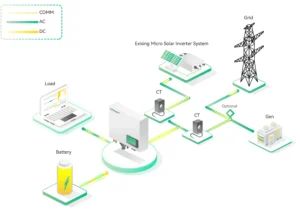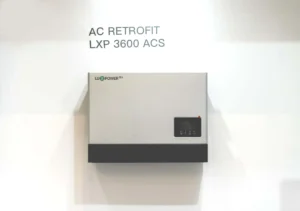Solar energy has turned the tide in its favor. Wondering why? Here are some key reasons.
- Renewable energy that doesn’t deplete after infinite usage.
- Free of cost, except you need to invest in the solar panels installation.
- Quality production with high efficiency and reliability
All such factors make it a practical energy resource. But there is one question: how do you produce and deploy solar energy in the system? Simple, use the magic tools— inverters.
There are often two types of inverters; AC and DC Coupled Inverters. But which one is the best? Today, we will explore two kinds of inverters and opt for the one that suits their needs and brings efficiency.
What is an AC Coupled Inverter?
AC coupled inverter is a device that transforms the AC to DC and then back to AC for energy usage and operations. In an AC-coupled system, energy goes through multiple conversions, leading to efficient energy usage and better efficiency.
The independent connections and transformation of the energy help convert and generate the power.
Pros and Cons of AC Coupled Inverter
Don’t underestimate the power of the AC-coupled inverters by looking at the energy losses and complexities. Instead, it delivers a perfect combo of the pros and cons.
Pros
- Easier installation. Even if you are not an expert, an AC-coupled inverter is still for you. Connect the panel, battery, and inverter. Get the installation done.
- Flexibility. Add multiple batteries based on your needs. Scale up your energy production. Such flexibility is less likely to be available with the other energy production systems.
- Versatile Access. Forget the addition of the different batteries, inverters, or other aspects. The grid independence with efficient energy production keeps you relaxed.
- Reliability. Since each component works independently, you don’t have to worry about failure. One system failure doesn’t block the whole chain. So you can rely on the entire system and achieve the highest efficiency.
Cons
- Decreased Efficiency. Multiple conversions of the power lead to increased power losses. So, overall energy production efficiency drops in such a system.
- Complexity of system. What do you expect since the system has to go for multiple conversions with inverters? Increased costs and complexity are massive drawbacks of AC-coupled inverters.
What is a DC Coupled Inverter?
DC-coupled inverters feed the DC energy produced by the solar panels to the batteries and transform it into AC for appliance usage. Single energy production and conversion elevates the ease of energy production with minimal losses.
You don’t have to go with the independent energy production setups. Plus, the ease of grabbing energy is next-level, with premium efficiency.
Pros and Cons of DC Coupled Inverter
Like the AC coupled system, guess the high efficiency and better results with the DC system. They transform the power and come with the following pros and cons.
Pros
- Efficiency. No multi-conversion scenarios. No worries about the power losses. What you get is a total powerhouse. Efficient energy production helps you better utilize your devices.
- Direct Battery Charging. DC power from the solar panels directly charges your batteries. That helps in the effective charging and discharging of the batteries. The energy supply is quite impactful and brings better production.
- Full power generation. You get instant and empowered battery storage without any losses and direct battery charging. In power outages, you get 100% energy production and utilization.
- Reduced costs. Costs are slashed when you don’t have to maintain the system. Moreover, the inverters work with the battery and panels without additional inverters or devices. You have to buy less tools and better save your money.
Cons
- No grid independence. DC-coupled inverters are less likely to work without grid systems. In case of power outages, they don’t support better also. So, it can be a problem for many users looking for efficient energy production.
- No scalability. If you add the new batteries, it is also not possible. Scalability limitations keep you from adding more to your system.
AC Coupled Inverter vs DC Coupled Inverter; Ultimate Differences

Both AC and DC-coupled Inverters can be a powerhouse of your systems. Regarding the perfect selection, you must consider one better system for your solar energy.
Be critical and scroll the following points before favoring the AC or DC coupled system.
-
System Efficiency
What if you get a system that converts the power from AC to DC and then back to DC? Multiple power conversions result in one thing— increased power losses.
Now consider this case of both AC and DC coupled inverters.
AC-coupled inverters are toxic for the energy. Solar panels produce DC power that is transformed into AC power for the appliances. The game doesn’t end here— conversion back to DC for battery storage also occurs. Such cases result in power losses. Therefore, you can achieve decreased efficiency compared to DC-coupled systems.
DC-coupled inverters don’t transform the power into DC and AC for storage. Instead, the energy produced by the solar panels gets stored directly before converting to AC power. Such a simple technique avoids the power losses due to multiple transformations and ensures better efficiency.
-
Scalability
If you want to run with your increasing energy needs, welcome to the AC and DC coupled inverters. Their high-end energy production mesmerizes the newer tech. Plus, businesses can scale up their energy needs based on the expansion.
AC-coupled inverters are pretty marvelous in energy scaling. If you have an existing system connected to your solar parts, don’t worry. Add new batteries or increase the energy production without any tension. Moreover, you can add more inverters and batteries to meet your increased energy needs.
A DC-coupled system doesn’t offer such high flexibility. The solar inverters work with the batteries and inverters like the one. That means you can’t add more batteries. Reconfiguration can be a hectic and costly task for the users. So, a DC-coupled system isn’t suitable for the retrofit designs and scalability of energy needs.
-
Grid independence and Backup Power

Batteries are the game-changer for the backup power. But how many days or hours can you grab the backup there? That depends on the power of the deployed system. In the current cases, you can talk about the backup power because of extensive power outages.
An AC-coupled system offers more independence. It can operate off-grid and nurture the energy instantly. Even if there is an outage for a longer time, you are free to get the energy. In power outages, you can grab sufficient energy resources and effective results.
DC-coupled systems might fail here. It is less likely to operate with grid independence. But some DC coupled do so with less likely energy storage and backup supply in case of power outages. You must choose your system wisely and efficiently based on your energy needs.
-
Battery Integration
If your batteries are directly connected to a power source, it helps better charge and discharge them. However, both AC and DC systems present a different scenario based on their implementation systems.
AC-coupled Inverters have to go through a different cycle of conversion. First, DC to AC and then to DC for battery storage involves an additional cycle. The result? Low efficiency, ineffective battery charging, and discharging. AC-coupled inverters offer low battery performance and better independence.
DC-coupled systems have a direct link with the battery storage. It means you can transform the DC storage without conversion to the DC. When the battery discharges, it converts DC to AC through the inverters. One-time conversion not only saves energy but also enhances the performance of the battery.
-
Costs and Complexity
System complexity can elevate the costs. Sometimes, it is beneficial to operate different systems for your solar energy. What do you prefer the most in such a case? Let’s compare the costs and complex operations of the AC and DC coupled inverters.
An AC-coupled inverter needs multiple energy inverters. One must transform the DC solar energy into the AC for the home appliances. The second one must consider the AC returning to DC for energy conversion. Do you think it is a hectic and complex system? But it comes with independent operations. Therefore, you can better scale to meet your elevated business needs.
Compared to it, a DC-coupled system operates differently. It transforms the power to DC and AC with a single inverter. One inverter is your jack of all trades- energy production or battery storage. Therefore, you need to invest less in costs and bring better results when there are some limitations for the energy.
Conclusion
The quality of AC or DC coupled Inverters can skyrocket your energy production. Moreover, the power losses are less, and efficient storage. You save on costs and elevate your energy needs.
What else do you need than finding a reliable brand for your DC and coupled inverters?
Guess what? You’ve found it— Lux PowerTek has years of experience. Our flawless and high-efficiency inverters promise boosted energy production. Ready to check our AC-coupled inverters? Find your best now!

